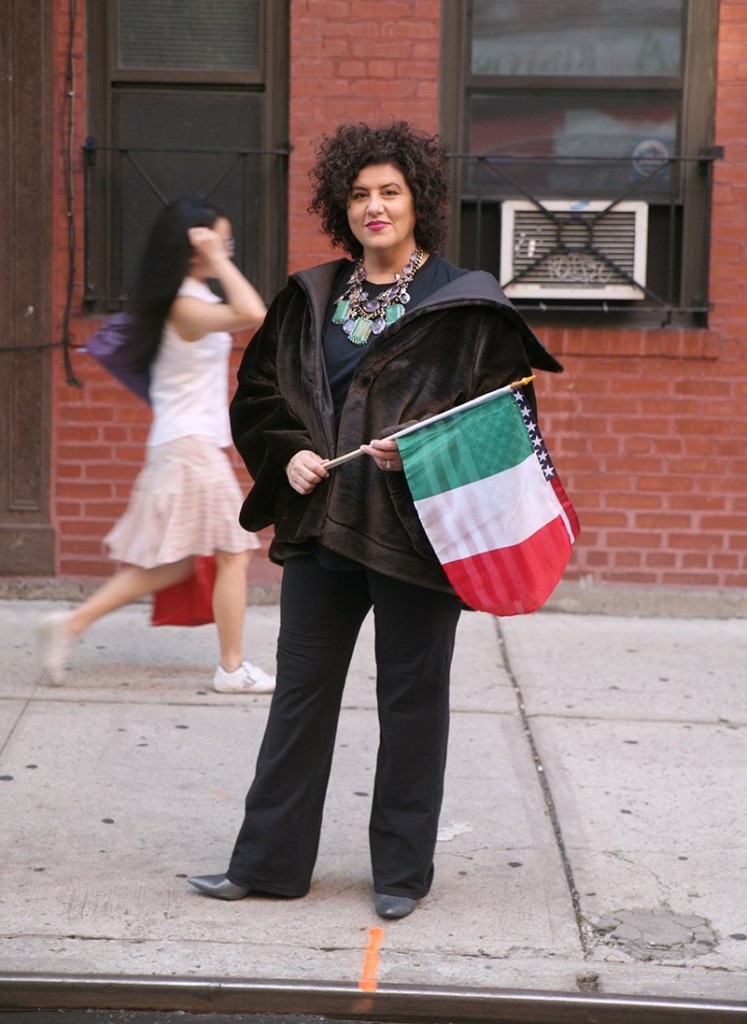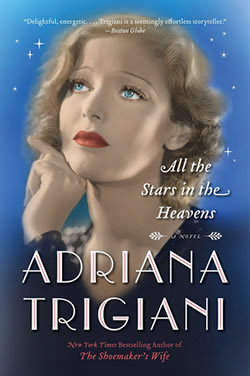Work in Progress
By Joan Tupponce
Despite 16 bestselling books, last year’s hit film Big Stone Gap and a slew of successful TV shows, author Adriana Trigiani says she has only just begun.

Themes of work and love fill the pages of Adriana Trigiani’s novels. “I am intrigued by how we survive by the labor of our own hands and who we choose to love and how these decisions build a life in full,” says the bestselling author, who grew up in a loving Italian family. “I truly am a heartbeat away from my immigrant grandparents. What they held precious I hold precious. In my family it was more important to be a hard worker than to be smart, than to be beautiful, than to be great at sports.”
Her parents and grandparents didn’t just preach the notion of hard work—they lived it. Her father, Anthony, moved the family from Roseto, Pennsylvania to Virginia’s Big Stone Gap to open a clothing factory. Her mother, Ida, a librarian, raised the couple’s seven children. Her paternal grandparents, Yolanda (Viola) and Michael Trigiani, owned Yolanda Manufacturing Company, a women’s blouse mill, and her mother’s father, Carlo Bonicelli, was a shoemaker with his own shop, which her grandmother, Lucia Bonicelli, a seamstress, ran after he passed away.
Hard work to Trigiani is a responsibility, a mission, a passion and a focus. She writes at least six hours a day, and is currently laboring over her next book, Kiss Carlo, her 17th, set to release in 2017. “It’s on me to get up early and meet the deadlines, to go out and be an advocate for the work,” she says. “That’s the deal.”
 Trigiani moved to New York City in the early 1980s where she founded, wrote, directed and performed with the all-girl comedy troupe The Outcasts. “We worked in the Manhattan cabaret circuit,” she says, noting that she held a variety of day jobs, from working as a secretary on Wall Street to being a phone installer for the Super Bowl before being hired as a television writer in 1988.
Trigiani moved to New York City in the early 1980s where she founded, wrote, directed and performed with the all-girl comedy troupe The Outcasts. “We worked in the Manhattan cabaret circuit,” she says, noting that she held a variety of day jobs, from working as a secretary on Wall Street to being a phone installer for the Super Bowl before being hired as a television writer in 1988.
She would go on to write and produce The Cosby Show and A Different World and author 16 books, including her widely popular Big Stone Gap series and her most recent novel, All the Stars in the Heavens, which will be released in paperback this summer.
But family always comes before any book, any movie, any play, any project. Today she and her 13-year-old daughter, Lucia, and her husband, Tim Stephenson, an Emmy Award-winning lighting designer who will be lighting the Olympics this summer, live in Greenwich Village in a cozy 1838 brownstone. Her home reflects not only Trigiani’s personal flair, but also her strong Virginia roots. “I love everything about Virginia,” she says.
And Virginia loves her. Recently inducted into the Virginia Communications Hall of Fame, Trigiani has a lengthy list of accomplishments that are a testament to her hard work and tenacity.
For her film Big Stone Gap, which she wrote and directed, she had to fight to shoot in Virginia. Incentives provided by other states, including Georgia, and other countries (Canada in particular) were competitive, but Trigiani was determined to shoot the film in Big Stone Gap because she wanted her hometown to benefit from the business that would come from making the movie.
The 15-year-long process began in 1998 and ended in October 2013 when the cameras began rolling. “It’s like a dog with a big bone,” she says of the film’s 11-week run last year. “People loved it and went back to see it.”
When Trigiani talks about her early years in Big Stone Gap, she playfully says she was a slick wheeler-dealer, often roping her four sisters into the babysitting agency she formed to make extra money. She was also a pro at plotting how to get out of her dishwasher duties after dinner.
“We each were assigned a different night to do the dishes,” explains her sister Pia Trigiani, a partner in law firm Mercer Trigiani in Alexandria. “She would start an argument to get out of doing the dishes. She would storm out and leave them to be done by someone else.”
Trigiani’s expressive imagination was in full swing even then. It churns constantly, coloring the world she sees and turning the places she’s lived into fanciful pop-up book adventures. “They weren’t just places. They were enchanted,” she says. “That’s why my movie Big Stone Gap looks like it does. I love beauty.”
Everything she writes about comes from something she has observed or something that actually happened in her childhood. “It’s almost like a door opens and the people are there,” she explains. “I find myself going to the place where they live. I am there watching them in my mind’s eye.”
She can’t shake the characters in her head nor would she want to. “They are very real to me,” she says, adding that writing is cathartic for her. “I work things out through the characters too.”
Trigiani’s energy, quick wit and enthusiasm are as undeniable and enviable as the value she attaches to friendships and people. That’s a trait her sister Pia appreciates and understands.
“Adri is still friends with a lot of her high school friends,” says Pia. “All along, Adri has kept her connections and contacts with people. All seven of us are that way.”
Trigiani found a place for many friends and locals from Big Stone Gap in her film. Fifteen paid speaking roles were cast locally even though most had never appeared in a play or movie. She also used local talent in other roles such as assistant to the director and dialect expert, and called on the town for transportation and location assistance. Local musicians were used on the soundtrack.
“She has an amazing way of sharing her opportunities with everybody else,” says Pia.
The gesture was Trigiani’s way of following in the footsteps of her father when he built his factory in Big Stone Gap. “My father never got rich, but what he loved was giving people jobs,” she says. “Years later what gave me the greatest pleasure of doing the movie was giving people jobs.”
Even though she’s accomplished so very much over the years, she believes she still has a long way to go. “I feel like I am just getting started,” she says. “I am a work in progress.” AdrianaTrigiani.com
